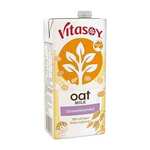Credit to hamza23 for same post description in March 2025 https://www.ozbargain.com.au/node/897438
Price matching Coles + additional 10% off via subscribe & save.
Oat Milk
Australian grown whole oats
38% of your daily calcium~
Contains beta-glucan
Source of fibre
No artificial colours, flavours or preservatives
Non GMO
Also available: 12 pack $19.80 or $17.82 S&S
Almond Milk
Australian grown whole almonds
Enriched with calcium
Natural source of Vitamin E
Naturally free from gluten, dairy, lactose and cholesterol
38% of your daily calcium~
No artificial colours, flavours or preservatives
Non GMO
$0 delivery with Prime, $59 spend or subscribe & save if you already have an active subscription.



 CamelCamelCamel
CamelCamelCamel